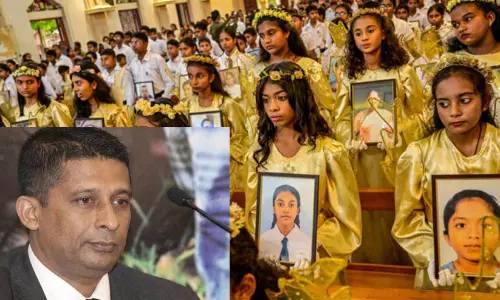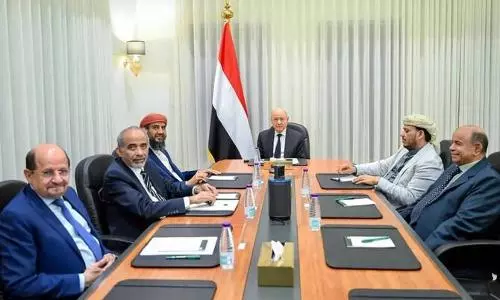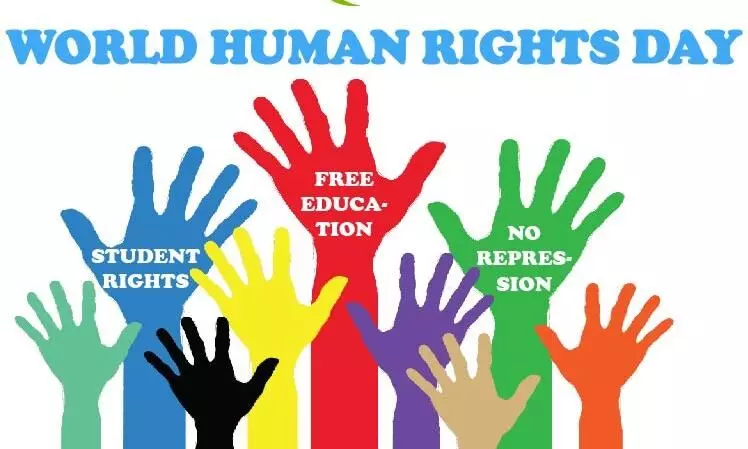
Human Rights at 75: securing equal rights for all
text_fieldsOn December 10, we commemorate the momentous occasion of the 75th anniversary of the adoption of the Universal Declaration of Human Rights, a profound and far-reaching human rights agreement. It was on December 10, 1948, that the story began in earnest, with the adoption of the UDHR by the United Nations General Assembly. The Declaration arose from the ashes of the Second World War and aimed to launch a new and brighter era of progressive rights. Interestingly, the principles contained therein are as relevant today as they were in 1948. For the last 75 years, the core ambition of the Declaration has been to infuse societies with equality, fundamental freedoms and justice. The Declaration enshrines the rights of all human beings. It is a global blueprint for international, national, and local laws and policies and a bedrock of the 2030 Agenda for Sustainable Development.
In simple terms, Human Rights are rights that everyone should have because they are human. It empowers us all. The 30 Articles defined in the Universal Declaration established universal human rights based on humanity, freedom, justice, and peace. India has included indivisible human rights in our fundamental rights' scheme of the Constitution, most of which cannot be changed even through the amendment process, which means, it is difficult for anyone, including the Parliament and the Government to take away the basic rights of a citizen. Fundamental Rights preserved in our Constitution are the cornerstone of our constitutional and representative democracy. For, if given, such a right would provide a “field day for crackpots”, a pain in the neck for legislators and the executive.
Age of Treaties
Today we live in an age of human rights treaties. There are nine “core” human rights treaties which have been ratified by the vast majority of countries. Yet the human rights agenda has fallen on hard times. Women lack equality, dissenters are persecuted, and political freedoms are curtailed. There are countries that combine political repression and economic liberalism. Others follow the route of political authoritarianism. Age-old scourges such as slavery, exploitation, trafficking and forced labour continue to exist. Nations seem to have lost much of their moral authority. It was not supposed to be like this.
The modern notion of human rights emerged during the 18th century. The present poses a time when human rights violations remain widespread. As such, the discourse on human rights continues to flourish. The use of “human rights” in English language books has increased 200-fold since 1940, and is used today 100 times more often than terms such as “constitutional rights” and “natural rights”. Now people have begun to criticize governments in the distinctive idiom of human rights.
Has the vision failed?
Many still argue that the incorporation of the idea of human rights into international law is one of the great moral achievements of human history. Human Rights Law gives rights to all people regardless of nationality. When foreigners criticize the governments for abusing their citizens, you cannot now rely on traditional riposte such as “sovereignty” or “none of your business” theories. Human rights provide people with valuable protections against the powers of the State. Yet Governments continue to violate them with impunity. Why do more than 150 countries out of the 193 countries that belong to the UN engage in torture? Why are authoritarian Governments increasing in number? Why do women still remain a subordinate class? Why do children continue to work in mines, factories and hazardous employments?
The truth is that human rights law has failed to accomplish its objectives. There is little evidence that human rights treaties have improved the well-being of the people. The reason is that human rights have never been as universal as people hoped.
The Declaration was not a treaty in the formal sense. It did not create legally binding obligations. It was not ratified by nations, but approved by the General Assembly. United Nations Charter did not give the General Assembly the power to make International Law. Rights were described in vague, aspirational terms, which could be interpreted in multiple ways. True, the words in the Declaration are stirring, but they did not capture the imagination of the commoners, politicians and intellectuals.
For Americans, human rights consisted of political rights such as the right to vote, to speak freely, not to be arbitrarily detained, and to practise the religion of choice, and so on. For Russians, it consisted of social or economic rights such as the right to work, healthcare, and education. Liberal countries supported political rights; socialism supported economic rights. Within another 18 years, the UN adopted a political rights treaty and an economic rights treaty and it became effective in 1976.
Historian Samuel Moyn in his book, The Last Utopia, argued that human rights became a major force in international relations only in the late 1970s. The period of the 1990s was the high watermark for the idea of human rights. Now rulers and parliamentarians invoke the term “human rights” not because they have become idealistic, but to express their idealistic goals or to conceal their strategic goals. The world is a freer place now than it was 75 years ago, but is it freer because of human rights treaties or because of other events, such as economic growth? Treaties are hopelessly ambiguous allowing governments to rationalize anything they do. Sloppy draftsmanship and deliberate choices overload the treaties with hundreds of poorly defined obligations and vague expressions. The sheer quantity and variety of rights intended to protect human interests can provide no guidance to governments. Given that all governments have limited resources and budgets, protecting one human right might prevent a government from protecting another.
In most countries, torture is not a matter of official duty. Yet it continues as an effective remedy to maintain order or to solve crimes. Simultaneously, freedom of expression does not extend to hate speech and could be limited by considerations of public order and morals. But is there any specific guidance for the nations in the exercise of enormous discretion? The US Supreme Court decided that freedom of speech did not encompass fraudulent, obscene and defamatory statements as discernible from the decisions in Roth (1957), Brandenburg (1969) and Bethel School District (1986). American public accepted the same as it justly coincided with their moral views and the Court continues to enjoy a high degree of public trust.
The language of rights is sometimes too spongy to prevent governments from committing abuses. William Easterly, in his influential book, The White Man’s Burden, convinces that Westerners no longer believe that white people are superior to others on racial grounds, but they do believe that regulated market, the rule of law, liberal democracy are superior to the systems that prevail in non-western countries.
Walk for your rightsDignity, freedom and justice are intrinsic values that are indispensable for a free society. Human dignity is the basis of justice and its link has been explicitly established in the preamble to the Universal Declaration of Human Rights by proclaiming that recognition of the inherent dignity and of the equal and inalienable rights of all members of the human family is the foundation of freedom, justice and peace in the world. Its relevance is seen repeated numerous times in international documents by affirming the faith in the dignity of the human person.
Reverence for the nobility of a human being is the cornerstone of a body politic that believes in orderly progress. Violations of dignity and freedom reverberate across borders and generations. Dignity and freedom smoothen the atmosphere by promoting peace and justice. So much so, that when dignity and freedom are lost, the breath of life gets into oblivion. What can be more important than these facets of human personality? The right to human dignity and freedom is available to all people-women, youth, minorities, differently abled, indigenous people, migrant workers and the like. However, today their voices are seldom heard in public life and they are often ignored in political decision-making.
Leave no one behind
Poverty prevails as the gravest human rights challenge now and always. Poverty not only breeds insecurity in individuals and their lives but also contributes to broader instability and conflict. Poverty is a cause and a product of human rights violations. Often people whose rights are denied, the victims of discrimination or persecution are more likely to be poor. They have little access to basic services and resources. Poor people cannot enjoy their right to education, health and housing simply because they cannot afford them. Poor face constraints in having access to justice, despite the golden guarantee in the form of equal access to justice and free legal aid to the poor. Poverty can affect all human beings. Yet poverty is rarely seen through the prism of human rights.
Justice and peace
A sustainable future is the minimum guarantee for people and the universe. It cannot be achieved without addressing poverty, and inequality and without establishing peace, solidarity and justice. We must respect the dignity of all equally. We must put an end to hunger, ensure good health and well-being, provide quality education to children, enforce gender equality and thereby achieve justice and order in society. This requires a new social contract that respects the dignity and freedom of all equally. Albert Einstein said: “Peace cannot be kept by force; it can only be achieved by understanding”.
The essence of society is peacemaking. It involves a change of mindset and loyalties and embracing a world perspective culture by surrendering our narrow-mindedness. The basis of peace and stability in every society is the fullest respect for the human rights of all people. Life is always better in a world of peace. Like lotus in water, peace adds beauty and flavour to life. We look forward to those who are able to generate lasting impressions as peacekeepers and peacemakers. We owe individual responsibilities to make the world a more peaceful place. Article 51 of the Constitution obligates our nation to endeavour to promote international peace and security and maintain just and honourable relations between nations.
Peace is not a stand-alone human right but is the consequence of the realization of all human rights. A life in peace is grounded in the principle of human dignity. Article 1 of the Draft Declaration on the Right to Life in Peace states: “Everyone is entitled to the promotion, protection and respect of all human rights and fundamental freedoms, in particular the right to life, in a context in which all human rights, peace and development are fully implemented”.
Securing peace means ending all forms of violence - direct, structural, and cultural. UN General Assembly Resolutions on the “Declaration on the Preparation of Societies for Life in Peace” adopted in 1978 and the “Declaration on the Right of Peoples to Peace” adopted in 1984 are the UN Instruments constituting the soft law and recognizing the right to peace. Thus, the right to peace strengthens the right to life and development. The Preamble to the Constitution of the World Health Organization states that the health of all peoples is fundamental to the attainment of peace and security on this earth and this is dependent upon the fullest co-operation of individuals and States. In the Re-Ramlila Maidan Incident case (2012), the Supreme Court of India recognized quietness and peace as part of an individual’s physical state.
Peace with nature
Making peace with nature is the only pathway for fairer societies to tackle climate change, biodiversity loss and pollution, which are the three self-inflicted planetary emergencies of the 21st century placing the present and future generations at unacceptable risk. Our consumption and production systems are substantially damaging the environment and ecosystem. Therefore, there is a need to address environmental emergencies and human well-being together. We must set the planet to healing and make sure that the healing process lasts. Planetary emergencies are likely to cause more pain in the long run. Realizing this reality, we must transform as fairer societies by valuing nature and focusing on its health at the heart of all our decisions.
Sustainable development
Sustainable Development is the minimum guarantee for people and the universe. A humble approach by integrating human rights into development can secure human well-being on a healthy planet. The 2030 Sustainable Development Agenda with the 17 goals to be achieved for transforming the world, The UN Framework Convention on Climate Change(1992), the Paris Climate Agreement of 2015, the Glasgow Declaration of 2021and the recent UAE Declaration on climate action by reforming climate finance should guide the core State actions and climate measures. The French philosopher and political thinker Jacques Maritain says: “Man is an individual who holds himself in hand by his intelligence and his will; he exists not merely in a physical fashion. He has a spiritual super-existence through knowledge and love, so that he is, in a way, a universe himself, a microcosmos, in which the great universe in its entirety can be encompassed through knowledge”. The 75th anniversary compels us to think about the incredible history that led to the Universal Declaration and its purpose in recognizing the equal and inalienable rights of all.
(Dr. Pauly Mathew Muricken is a lawyer, writer and academic based in Kochi)























